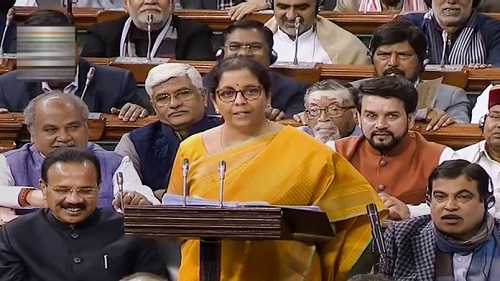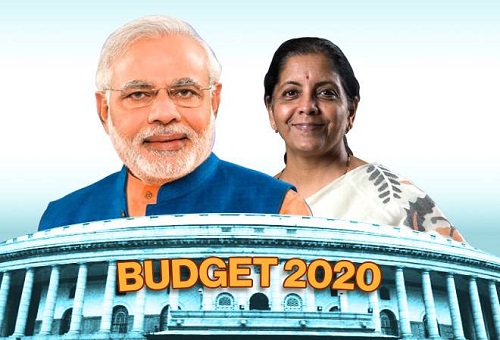 Finance Minister Nirmala Sitharaman presented Union 2020-21, on Saturday, February 1, 2020. The Budget addressed following important points related to textile, apparel and fashion industry:
Finance Minister Nirmala Sitharaman presented Union 2020-21, on Saturday, February 1, 2020. The Budget addressed following important points related to textile, apparel and fashion industry:
• Anti-dumping duty on PTA abolished
• National Technical Textiles Mission to be set up
• Review of Rules of Origin in FTAs
• Schemes for Remission of Duties & Taxes levied on Export Products ( RODTEP)
• Budget Grant for Procurement of Cotton by Cotton Corporation under Price Support Scheme has reduced to Rs 0.01 Cr for 2020-21 compared to Rs 2,017.57 Cr in 2019-20
• Customs duty raised on items like footwear (from 25 to 35 per cent; 15 to 20 on footwear parts)
Removal of Anti Dumping Duty on PTA-A potential game changer
On the proposed abolishan of anti-dumping duty on PTA (Purified Terephthalic Acid), the FM said PTA is a critical input for textile fibres and yarns. Its easy availability at competitive prices is desirable to unlock the immense potential in textile sector which is a significant employment generator. The textile industry has been demanding abolition of anti-dumping duty levied on PTA, the basic raw material used for manufacturing polyester staple fibre and filaments, to remain globally competitive. The Ministry of Textiles envisaged to increase the textile business size from the current level of around US$169 billion to US$350 billion by 2025 and to US$650 billion by 2030 in its draft Textile Policy.
critical input for textile fibres and yarns. Its easy availability at competitive prices is desirable to unlock the immense potential in textile sector which is a significant employment generator. The textile industry has been demanding abolition of anti-dumping duty levied on PTA, the basic raw material used for manufacturing polyester staple fibre and filaments, to remain globally competitive. The Ministry of Textiles envisaged to increase the textile business size from the current level of around US$169 billion to US$350 billion by 2025 and to US$650 billion by 2030 in its draft Textile Policy.
To achieve this ambitious target this step is being seen in the right direction to make polyester fibre and filaments available at international prices as there is a limitation in increasing fibre base within the country.
All industry leaders across board have applauded the removal of anti dumping duty on PTA. “This will give a major boost to Indian textile industry and will go a long way in helping downstream industry staying competitive,” says T Rajkumar, Chairman, CITI. Elaborating on the same Rahul Mehta, Chief Mentor, CMAI says, “The most important step in this Budget is the removal of the anti-dumping duty on PTA, which was a long standing demand of the textile manufacturing value chain, as PTA is a crucial input for polyester production. This will potentially open up the MMF value chain, and give a fillip to the entire MMF industry and enhance its global competitiveness. Technical textiles, home furnishing, sportswear, saris, dress materials etc, will all benefit greatly from this move. It has the potential of being an important game changer for the MMF segment of the Industry.”
Reacting to the Budget proposals 2020-21, Ashwin Chandran, Chairman, Southern India Mills’ Association (SIMA), stated PTA being imported from different countries including China, Indonesia, Taiwan, Iran, Malaysia, attracts anti-dumping duty between US$27 to US$160 per metric tonnes depending on the country of origin, while India often faces shortage of PTA that curtail capacity utilization of polyester segment industry. It shall greatly help the country to enhance its global competitiveness, boost exports and enable domestic manufacturers to compete with cheaper imports.
National Technical Textiles Mission: Boost investments, reduce imports
The FM proposed the setting up of a National Technical Textile Mission with four-year implementation period from 2020-21 to 2023-24 at an estimated outlay of Rs 1,480 crore.
from 2020-21 to 2023-24 at an estimated outlay of Rs 1,480 crore.
“This can position India as a global leader in technical textiles, which includes development of rainwear, sportswear, retarded apparel, fire resistance garments,” opines A Sakthivel, Chairman, AEPC. Agrees Sanjay Jain, former president CITI and says, “This is a fantastic announcement, it will lead to capacity building and import substitution. It has tremendous scope, however we are waiting for the fine print.”
Elaborating further T Rajkumar explains, “The mini mission on technical textiles is welcome. Technical textiles has to be encouraged as a lot of fabrics we use in the sector are being imported, the move will help in starting production of specialised input in our country, a lot of investment will come which will also boost employment in the sector.”
Chandran believes India has an importing technical textiles segment estimated at US$16 billion per year, this Mission would help strengthen the sector which can take advantage of benefits already extended under different State Textile Policies and also the Technology Upgradation Fund Scheme. He also appreciated the enhanced allocation of Rs761.90 crores for A-TUF Scheme as against Rs700 crores allotted previous year. Ujjawal Lahoti, Past Chairman, Textile Export Promotion Council (Texprocil) welcomed the base support given to Technical Textile saying “It will result in to setting up production of import substitute textiles items.”
Review of the Rules of Origin in FTAs to curb imports from Bangladesh
All industry leaders welcomed the intent to review the rules of origin in FTAs. It was being observed that imports under Free Trade Agreements (FTAs) are on the rise. Undue claims of FTA benefits have posed a threat to domestic industry. Such imports require stringent checks. As per the Budget announcement, suitable provisions are being incorporated in the Customs Act and in coming months review of Rules of Origin requirements, particularly for certain sensitive items, shall be done, to ensure that FTAs are aligned to the conscious direction of our policy.
A lot of Chinese fabrics and raw materials converted into garments were entering into India through these FTAs. “The move will help reduce imports from Bangladesh etc, which plaguing textile industry. However, a complimentary step in this direction would be expediting FTAs with EU, Australia, Canada and initiating FTA with UK,” Shaktivel says.
Industry hails RODTEP, NIRVIK and other measures taken
As per A Sakthivel “The AEPC is studying the proposed Scheme for Revision of duties and taxes on exported products where exportr to be digitally refunded duties and taxes levied at the Central, State and local levels, which are otherwise not exempted or refunded. This is an important area which has seen significant shrinkage in policy support in last few months. The new NIRVIK scheme for higher export credit disbursements with greater coverage, reduced premium and simplified procedures for claiming settlements is a welcome step given the increased uncertainties in the global market. We look forward to further details of the scheme.”
AEPC also congratulated the finance minister on effectively addressing some key issues of the sector especially in the areas of Ease of Doing Business, National Logistics policy for making MSMEs competitive, simplified return with features like SMS based filing for nil return and improved input tax credit flow, enhancing digital connectivity, support for working capital, financing for MSMEs, five year exemption from audit for MSMEs & easing of tax filing for startups are some import steps towards easing the day to day functioning of MSMEs as also providing a conducive ground for investors.
On similar lines Chandran hailed the announcement of the Schemes for Remission of Duties & Taxes levied on export products and NIRVIK for extending competitive credit facilities and higher insurance coverage with lesser premium and also simplified procedure for claim settlements. “Happy to note that FM announced again that Refund of Taxes scheme (RODTEP) will be soon implemented for exporters. As exporters of cotton textiles products are suffering due to a sharp decline in exports of yarn, and retrospective removal of MEIS, it is important to get this scheme implemented for exports all textile products at the earliest,” says Lahoti
SIMA also welcomed the announcement of addressing inverted duty structure in GST as textile industry has been suffering with huge accumulation of inverted duty of capital goods and certain services. Prem Mallik, a veteran in textile industry and past president CITI, states, “The announcement on refund of taxes including electric duty, mission on technical textiles and intent to incorporate rules of origin in FTA,S are welcome steps. I request the government to implement these positive steps, immediately.”
However not all are happy with the Budget proposals as R D Udeshi, President Polyester Chain, Reliance Industries opines “Disappointing Budget, as very little has been done for textile industry. More concrete steps were required for growth of the industry. Vision of $400 bn will remain only on paper,” he summed up.












